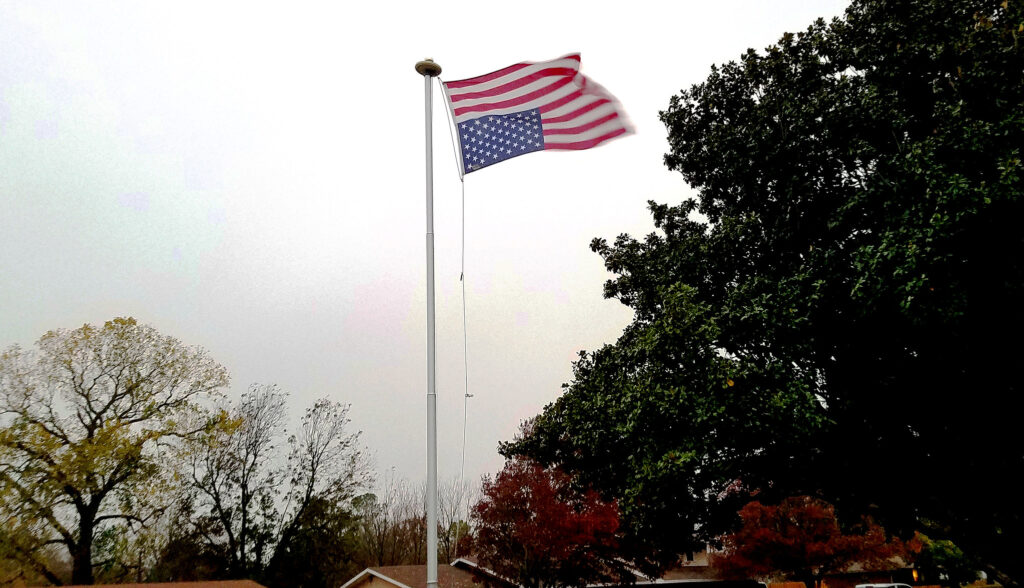
The recent upside-down-flag controversy surrounding Justice Samuel Alito has drawn the attention and scorn of many this past week. Much can, must, and has been said about Alito’s constitutional role as an impartial arbiter of the nation’s highest laws. Yet what has most drawn my interest to this incident is its connection to the broader trend of flag flying. The emergence of the Trump flag, as well as Alito’s alternate flag-related expression of Trump fidelity, has raised real questions about the evolving nature of American patriotism.
I confess to having struggled to grasp the deeper meaning of the proliferation of flags meant to express fidelity to individual political figures and leaders. Since I saw the first Trump flag flying over an American flag or in place of it, I have felt uneasy and uncertain about its meaning. It certainly has no precedent in recent American history. But because I am teaching a seminar on Alexis de Tocqueville’s “Democracy in America,” I have gained new insights into American political culture that have unlocked a possible deeper meaning in Alito’s gesture.
Tocqueville’s views on American patriotism
Tocqueville (1805-1859) was a French aristocrat who traveled with his friend, Gustave de Beaumont, to America in 1831-1832 putatively to study the American prison system, but more so to grasp the essence of the burgeoning democracy, in full anticipation of democracy spreading to Europe. Published in two volumes in 1835 and 1840, Tocqueville’s magnum opus would explore every element of American democracy. This certainly includes his understanding of patriotism.
Tocqueville was intrigued by Americans’ eagerness to express love and fidelity to their nation in a way that was largely absent in aristocratic European countries. Americans want to celebrate the greatness of their homeland, and are even more eager to hear others praise it, he notes: “A patriotism more trying or loquacious is impossible to imagine.” While Tocqueville sounds slightly annoyed by this American quality, more importantly, he is interested in understanding it in relation to its foundational equality. “The restless and insatiable vanity of democratic peoples is a product of equality and fragility of conditions,” he writes. Americans love their country because they do not especially stand out as individuals. But as they are all citizens, national pride is something in which they can all take ownership and a rightful degree of pride.
The French observer presses further to explore why Europeans lack this same national pride and patriotism. It is, for him, because they have emerged from the feudal order, remnants of which persisted in Tocqueville’s lifetime. In the feudal order, most were peasants or serfs, and in this context, “each individual knew only one man whom he was obliged to obey. It was through that man that each person was linked. . . . In feudal societies, all public order therefore hinged on the sentiment of fidelity to the very person of the lord.” This was further facilitated by the relatively loose authority of central governments at this time:
Feudal institutions obscured the fatherland and made loving it less necessary. They made people forget the nation and invest their passions in a man.
Lords were viewed as providers and protectors and hence had a greater claim to the serfs’ fidelity. Love of country might have existed in feudal societies, for Tocqueville, but “that love existed only as a feeble and obscure instinct; it grew clearer and stronger as classes were destroyed.”
America in 2024 has lost that sense of social mobility
Returning to the present, whereas for Tocqueville America was fundamentally defined by its “equality of conditions,” or what we now call “economic equality,” inequality has exploded over the past four decades. Social mobility is sharply declining and classes have become more fixed and defined. Dutch philosopher Ingrid Robeyns recently commented, notwithstanding rare exceptions like Oprah Winfrey, “Social mobility is dead in some countries, and crumbling in many others.”
We can add, drawing from Tocqueville, nowhere in the world has social mobility been more central to national identity than in the United States. For Tocqueville, it is a “social state where neither law nor custom . . . keeps anyone in his place” that fosters its distinctive “restlessness” and national identity. While it may be fair to ask whether economic achievement can deliver personal happiness, nevertheless Americans’ historically distinctive mobility has also provided them with a profound reason to love their country. So if social mobility is no longer a realistic expectation among Americans, this shift would surely rock their identity to its core.
As such, it is reasonable to ask, “How much do Americans still identify fundamentally as Americans in Tocqueville’s sense?” Or “Do Americans get their sense of self-worth from America’s achievements?” Or “Does America, as an idea, seem more remote from them now than in earlier generations?”
More to the point, do Trump flags (and upside-down American flags) tell us something about the degree to which many Americans have come to dissociate themselves from their “fatherland”? Has fidelity to Trump fundamentally come to assume the place in American hearts that was once occupied by America itself, just as serfs once gave their obedience, fidelity, and affection to their feudal lords?
In an age of growing inequality, what is America to Americans? America has in recent decades been less successful in providing the opportunities that defined it in Tocqueville’s times. For many Americans, this has meant transferring some of their affections from their nation to a single man. For those flying these flags, like Alito, we might ask them whether their affection for a man now transcends their love of country. But the rest of us should be asking ourselves, how has inequality made such a large number of citizens come to feel more like feudal underlings than proud American citizens.
David Lay Williams is professor of political science at DePaul University and author of the forthcoming “The Greatest of All Plagues: How Economic Inequality Shaped Political Thought from Plato to Marx” (Princeton University Press, 2024).



